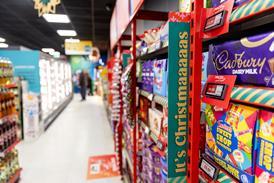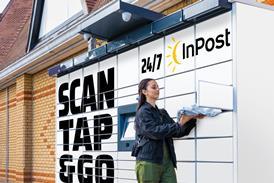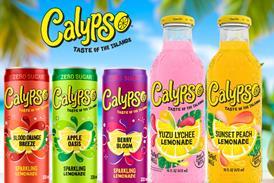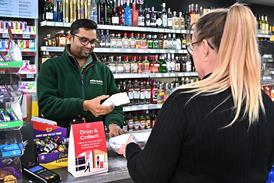Devon retailers Steve and Karen Woodman visited the US to see what they could learn from American c-stores. Dave Visick tagged along
It's a long way from Woolacombe to Washington, but it's more than distance which separates Steve and Karen Woodman's store on the Devon coast from its American cousins.
The Woodman's 1,200sq ft shop is the Londis Store of the Year and as part of the reward for their efforts the couple found themselves on a flight to the US capital with the Association of Convenience Stores' annual study tour, visiting stores and forecourts in Virginia and Georgia.
The visit came at a time when the US convenience industry, with some 145,000 stores employing 1.5 million staff, faces a crisis of identity. "There are some bold strategic moves under way," says Dan Munford of Insight Research. "Many of the established chains are having to redefine their image in the face of eroding margins on key products and competition from all around - Wal-Mart and even McDonald's compete in the same territory."
Outside the city centres, US convenience focuses on forecourts and it is tumbling margins on fuel sales which have caused the turmoil in the industry. "In 1999 gas sales amounted to 38% of profit contribution," says Munford. "Today, it's about 24%. The challenge now is to find something to replace that."
Scott Hartman, a US retailer with more than 50 stores in the Pennsylvania area, prepared the UK visitors for what to expect. "We're all about fresh food - and by that we mean food for now. Most of the hot food we sell is eaten within a few minutes of purchase. You'll also see the trend towards prepayment for everything, and more and more kiosk-based ordering and self-service."
The jetlagged Woodmans certainly got a wake-up call as they walked in to the Sheetz store in Haymarket, Virginia. This 3,500sq ft forecourt store manages 5,000 transactions a day and is part of a family-owned chain with 330 sites across six states. The group's strategy is to ring urban areas with stores rather than open in the cities, and given the American love affair with the car, it's a good choice. As one customer told C-Store: "You guys carry your shopping? We don't even walk."
"I can't believe the space they have," says Karen. "They've got a huge car park, the forecourt is vast and there doesn't seem to be any restriction inside. It's not like ours, where every square foot has to pay for itself."
Step through the door and you realise that 'convenience' is American for 'eat and drink now'. To the right of the tills there's a 30ft coffee counter with at least 12 varieties brewed and ready for self-service. "They've got more space for sugar, lids and stirrers than we have for coffee," laughs Karen. As it turns out, coffee is one of the defining characteristics of the US convenience chains; customers will choose where they stop by the quality of its brew.
Across the aisle there's a Fizz City drinks fountain with 30 varieties and cups - or should that be buckets - up to 44oz. Again, it's self-serve, and if there's a degree of trust involved it's reflected in the enormous margin on dispensed drinks. Some stores expect about 15% wastage in this area.
Beyond the dispenser are two walls of chilled beverages, with all the major brands and more besides. The number of energy drinks on sale, and the size of the containers, suggest that we will be seeing a lot more of these on our side of the Atlantic.
The chiller doors open directly into a cold store - shelves are filled from behind and extra stock is kept chilled a few feet away. Karen loves it. "I want one of those!" she says.
The store's high point is its automatic food ordering system. Touchscreens around the foodservice counter enable customers to design their own sandwich, baguette, burrito or tortilla. After entering their choices the user takes a printed ticket to the checkout and pays. By the time they return to the food counter, it's ready.
District manager Helen Smith showed Steve and Karen around the foodservice area. The automated service speeds things up, but preparing the food is still labour-intensive. "We have six staff on right now," says Smith. "Two are on food preparation but everyone is cross-trained. We aim to get food orders turned around inside two minutes."
There's one blinding difference between the Sheetz store and its UK counterparts, though; standard grocery fayre is confined to a small fixture at the back, and limited to a few tins and packets. There's no fresh fruit save a few bananas and apples, merchandised as healthy snacks. There are no fresh vegetables. In their place are rows of crisps, nuts, snacks and confectionery.
"They told us that 60% of the food sold in here is eaten within four minutes," says Karen. "It wouldn't work for us - we're the only shop in the area and there are certain lines that we just have to stock."
Perhaps the British just aren't ready to give up on home cooking yet, whereas the citizens of Virginia have enthusiastically embraced 'dashboard dining'. In America, the car is just another room of the house, and when Scott points out that "convenience stores are physically closer to the homes of America than any other channel of trade", he's factoring drive time into his calculation, not how far you have to walk.
This distinction is written all over Steve and Karen's next port of call, Millers Neighbourhood Market in Gainsville, which by British definitions is neither in a neighbourhood (it's on the main drag into Washington), nor is it a market, as it doesn't stock fresh fruit, veg or meat.
A sign outside advertising for 'Sandwich Artists' and the tables in the window give a clue to the theme here. With its Subway franchise, hot dogs on roller grills and heat-it-yourself pizza, the store is almost a fast food restaurant which sells a few take-home lines. Customers can wander the aisles as they munch their lunch and take a break from the traffic queues on the highway.
Steve's a bit worried about security. "There are a lot of people hanging about, and we've spotted a bit of pilfering. I guess an allowance is made for wastage. And what about safety? There are open pots of coffee within children's reach and self-service hot food everywhere."
After a few more store visits another difference becomes clear; there are no promotions. Prices are low already, and many stores offer large packs, particularly in beers and beverages, but you won't see multibuys or bogofs. Instead, the emphasis is on rewarding loyalty, usually in the form of points collected with each purchase, as in UK supermarkets.
Notable, too, is the standard of service. "One store we visited, Quik Trip in Atlanta, has a reputation for excellent staff, and they deserve it," says Steve. "You get a big hello as you walk in and all the staff are really chatty. You don't wait at the till - they come to you. We were told they hire staff for their personalities and you really notice the effect it has." Store assistants earn $8-11 an hour (£4-£5.50), with a deputy manager taking home about $40,000 a year.
One store impressed the Woodmans with an offer that they could see working in the UK. Wawa, with 570 stores in five states, takes the best of the American approach, but combines it with familiar aspects such as packaged fresh fruit and a healthy feel to the freshly prepared food. Add in high ceilings, clear signage, intelligent layout and soft music and the result is a very pleasant shopping environment.
"There are some things that American stores do really well," says Steve, "but they are not always things I can see crossing over into our market. I haven't seen a single store that you could pick up and drop into the UK, because we are just not bound to our cars in the way they are."
He adds: "The chains seem to be very strict with stores - they don't allow the retailer's personality to come through and there's no scope to bring in your own choice of lines to suit your customers."
Karen may one day get her rear-loading chilled cabinets, but it sounds like Woolacombe will be waiting a while longer for its 30-flavour drinks dispenser.
Food to go dominates
Prepay credit cards are popular
Stores are getting larger
Kiosk ordering and self-service food reduce queues
Teenagers are the latest target market
Restrooms are the next point of difference
Industry pays more in credit card fees than it makes in profit.
Generations of Americans have grown up expecting to be asked for ID if they attempt to purchase alcohol, so enforcement is easier than in the UK. Some store chains operate a Challenge 30 policy and defuse any tension with some clever psychology. A sign reads: "If you are under the age of 30, and are not asked for your ID, you will receive a FREE fountain drink of your choice."
It's a long way from Woolacombe to Washington, but it's more than distance which separates Steve and Karen Woodman's store on the Devon coast from its American cousins.
The Woodman's 1,200sq ft shop is the Londis Store of the Year and as part of the reward for their efforts the couple found themselves on a flight to the US capital with the Association of Convenience Stores' annual study tour, visiting stores and forecourts in Virginia and Georgia.
The visit came at a time when the US convenience industry, with some 145,000 stores employing 1.5 million staff, faces a crisis of identity. "There are some bold strategic moves under way," says Dan Munford of Insight Research. "Many of the established chains are having to redefine their image in the face of eroding margins on key products and competition from all around - Wal-Mart and even McDonald's compete in the same territory."
Outside the city centres, US convenience focuses on forecourts and it is tumbling margins on fuel sales which have caused the turmoil in the industry. "In 1999 gas sales amounted to 38% of profit contribution," says Munford. "Today, it's about 24%. The challenge now is to find something to replace that."
Scott Hartman, a US retailer with more than 50 stores in the Pennsylvania area, prepared the UK visitors for what to expect. "We're all about fresh food - and by that we mean food for now. Most of the hot food we sell is eaten within a few minutes of purchase. You'll also see the trend towards prepayment for everything, and more and more kiosk-based ordering and self-service."
The jetlagged Woodmans certainly got a wake-up call as they walked in to the Sheetz store in Haymarket, Virginia. This 3,500sq ft forecourt store manages 5,000 transactions a day and is part of a family-owned chain with 330 sites across six states. The group's strategy is to ring urban areas with stores rather than open in the cities, and given the American love affair with the car, it's a good choice. As one customer told C-Store: "You guys carry your shopping? We don't even walk."
"I can't believe the space they have," says Karen. "They've got a huge car park, the forecourt is vast and there doesn't seem to be any restriction inside. It's not like ours, where every square foot has to pay for itself."
Step through the door and you realise that 'convenience' is American for 'eat and drink now'. To the right of the tills there's a 30ft coffee counter with at least 12 varieties brewed and ready for self-service. "They've got more space for sugar, lids and stirrers than we have for coffee," laughs Karen. As it turns out, coffee is one of the defining characteristics of the US convenience chains; customers will choose where they stop by the quality of its brew.
Across the aisle there's a Fizz City drinks fountain with 30 varieties and cups - or should that be buckets - up to 44oz. Again, it's self-serve, and if there's a degree of trust involved it's reflected in the enormous margin on dispensed drinks. Some stores expect about 15% wastage in this area.
Beyond the dispenser are two walls of chilled beverages, with all the major brands and more besides. The number of energy drinks on sale, and the size of the containers, suggest that we will be seeing a lot more of these on our side of the Atlantic.
The chiller doors open directly into a cold store - shelves are filled from behind and extra stock is kept chilled a few feet away. Karen loves it. "I want one of those!" she says.
The store's high point is its automatic food ordering system. Touchscreens around the foodservice counter enable customers to design their own sandwich, baguette, burrito or tortilla. After entering their choices the user takes a printed ticket to the checkout and pays. By the time they return to the food counter, it's ready.
District manager Helen Smith showed Steve and Karen around the foodservice area. The automated service speeds things up, but preparing the food is still labour-intensive. "We have six staff on right now," says Smith. "Two are on food preparation but everyone is cross-trained. We aim to get food orders turned around inside two minutes."
There's one blinding difference between the Sheetz store and its UK counterparts, though; standard grocery fayre is confined to a small fixture at the back, and limited to a few tins and packets. There's no fresh fruit save a few bananas and apples, merchandised as healthy snacks. There are no fresh vegetables. In their place are rows of crisps, nuts, snacks and confectionery.
"They told us that 60% of the food sold in here is eaten within four minutes," says Karen. "It wouldn't work for us - we're the only shop in the area and there are certain lines that we just have to stock."
Perhaps the British just aren't ready to give up on home cooking yet, whereas the citizens of Virginia have enthusiastically embraced 'dashboard dining'. In America, the car is just another room of the house, and when Scott points out that "convenience stores are physically closer to the homes of America than any other channel of trade", he's factoring drive time into his calculation, not how far you have to walk.
This distinction is written all over Steve and Karen's next port of call, Millers Neighbourhood Market in Gainsville, which by British definitions is neither in a neighbourhood (it's on the main drag into Washington), nor is it a market, as it doesn't stock fresh fruit, veg or meat.
A sign outside advertising for 'Sandwich Artists' and the tables in the window give a clue to the theme here. With its Subway franchise, hot dogs on roller grills and heat-it-yourself pizza, the store is almost a fast food restaurant which sells a few take-home lines. Customers can wander the aisles as they munch their lunch and take a break from the traffic queues on the highway.
Steve's a bit worried about security. "There are a lot of people hanging about, and we've spotted a bit of pilfering. I guess an allowance is made for wastage. And what about safety? There are open pots of coffee within children's reach and self-service hot food everywhere."
After a few more store visits another difference becomes clear; there are no promotions. Prices are low already, and many stores offer large packs, particularly in beers and beverages, but you won't see multibuys or bogofs. Instead, the emphasis is on rewarding loyalty, usually in the form of points collected with each purchase, as in UK supermarkets.
Notable, too, is the standard of service. "One store we visited, Quik Trip in Atlanta, has a reputation for excellent staff, and they deserve it," says Steve. "You get a big hello as you walk in and all the staff are really chatty. You don't wait at the till - they come to you. We were told they hire staff for their personalities and you really notice the effect it has." Store assistants earn $8-11 an hour (£4-£5.50), with a deputy manager taking home about $40,000 a year.
One store impressed the Woodmans with an offer that they could see working in the UK. Wawa, with 570 stores in five states, takes the best of the American approach, but combines it with familiar aspects such as packaged fresh fruit and a healthy feel to the freshly prepared food. Add in high ceilings, clear signage, intelligent layout and soft music and the result is a very pleasant shopping environment.
"There are some things that American stores do really well," says Steve, "but they are not always things I can see crossing over into our market. I haven't seen a single store that you could pick up and drop into the UK, because we are just not bound to our cars in the way they are."
He adds: "The chains seem to be very strict with stores - they don't allow the retailer's personality to come through and there's no scope to bring in your own choice of lines to suit your customers."
Karen may one day get her rear-loading chilled cabinets, but it sounds like Woolacombe will be waiting a while longer for its 30-flavour drinks dispenser.
US trends at a glance
Food to go dominates
Prepay credit cards are popular
Stores are getting larger
Kiosk ordering and self-service food reduce queues
Teenagers are the latest target market
Restrooms are the next point of difference
Industry pays more in credit card fees than it makes in profit.
Turning the tables
Generations of Americans have grown up expecting to be asked for ID if they attempt to purchase alcohol, so enforcement is easier than in the UK. Some store chains operate a Challenge 30 policy and defuse any tension with some clever psychology. A sign reads: "If you are under the age of 30, and are not asked for your ID, you will receive a FREE fountain drink of your choice."






















No comments yet